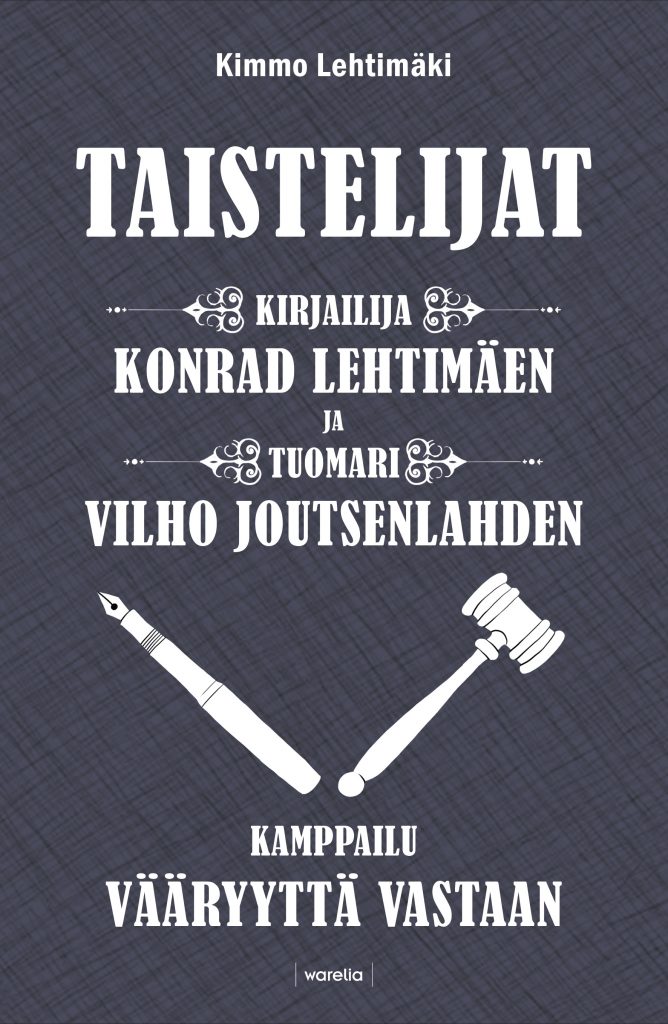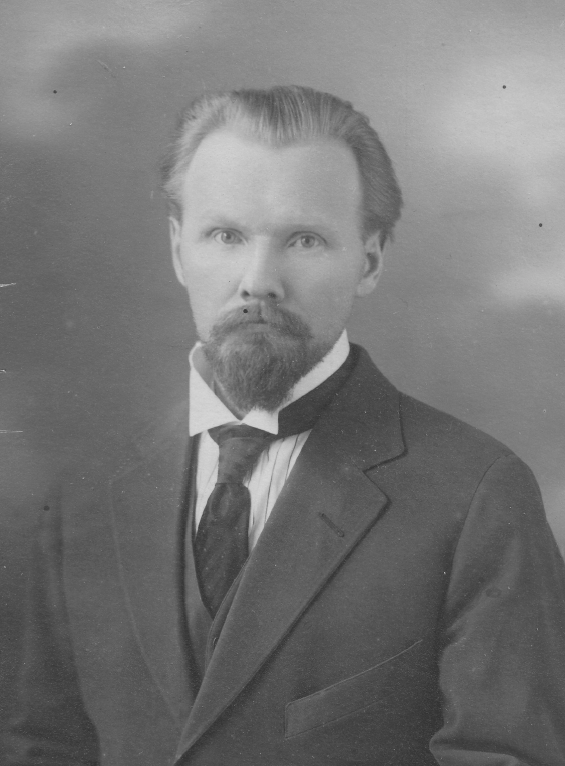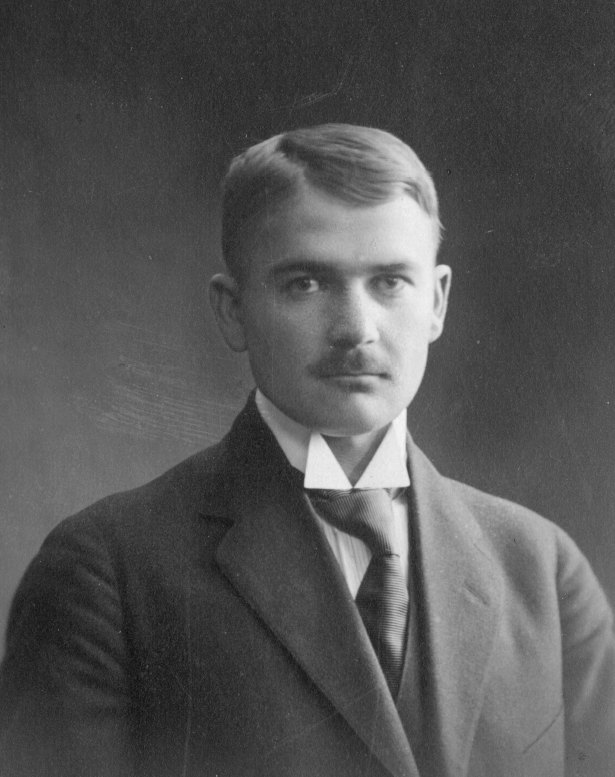
Kimmo Lehtimäki: Taistelijat – Kirjailija Konrad Lehtimäen ja tuomari Vilho Joutsenlahden kamppailu vääryyttä vastaan. Warelia 2025. Available only in Finnish.
ENGLISH SUMMARY
This extensive book “Fighters – Author Konrad Lehtimäki and Judge Vilho Joutsenlahti’s fight against injustice”, presents a detailed and multifaceted examination of Finnish political history: from the late 19th century through the interwar period, focusing particularly on the lives and contributions of Konrad Lehtimäki and Vilho Joutsenlahti. It interweaves biographical narratives with broader socio-political contexts, legal struggles, cultural productions, and contested historical interpretations surrounding Finnish independence, the Civil War, and subsequent political repression.
Konrad Lehtimäki: Literary and Political Life
Konrad Lehtimäki (1883–1937) was a prominent Finnish writer, social activist, and politician whose life encapsulated the struggles of the Finnish working class and the socialist movement in the early 20th century. His autobiographical novel series Taistelija (”The Fighter”) reflects his personal and political battles, including hardships in publishing due to political repression and financial difficulties. Lehtimäki’s experiences as a red prisoner during the 1918 Civil War, his near execution, and his long-term health struggles, including morphine treatment for tuberculosis, are detailed with nuance, highlighting the social stigma and personal trauma he endured.
Born in 1883 near Vahto, Lehtimäki’s early life was marked by family hardship and diverse occupations before he became a master baker and later a dedicated Social Democratic Party (SDP) activist. He served as Viipuri district secretary and parliamentarian, advocating for Finnish independence and workers’ rights. His political activism included participation in anti-Russian demonstrations and resistance to oppressive laws, often resulting in legal challenges such as charges of high treason related to his speeches.
Lehtimäki’s literary career was distinguished by works like Spartacus (1914) and Ylös helvetistä (1917). – The latter, a visionary science fiction novel, anticipated future developments in warfare technology. His play Spartacus symbolized Finnish resistance against Tsarist oppression and was widely acclaimed in socialist circles, though criticized by conservative media. His writings combined expressive style with pacifist and revolutionary themes, reflecting his complex ideological stance.
During World War I, Lehtimäki maintained clandestine contacts with Russian revolutionaries and the Finnish Jäger Movement, illustrating the intricate alliances in Finland’s fight for independence. He fled to the United States in 1916 to escape Russian surveillance, returning after the 1917 Russian Revolution. Arrested during the Civil War and sentenced to death, his sentence was commuted due to interventions by cultural figures and evidence of his complex political affiliations, including intelligence work for Germany.
Lehtimäki’s later years involved continued literary work and inventive efforts, including proposals for novel aircraft defense weapons. Despite declining health and political repression, his legacy was honored posthumously with monuments and scholarly attention, including biographies by Kaarlo Isotalo and Raoul Palmgren.

Vilho Joutsenlahti: Legal Defender and Political Actor
Vilho Joutsenlahti (1884–1943) was a Finnish lawyer and politician who played a pivotal role in defending leftist activists and political prisoners during Finland’s turbulent early 20th century. Educated at the University of Helsinki, he became involved in socialist youth movements and later served as acting head of Viipuri’s Detective Central Police Department amid revolutionary upheavals.
Joutsenlahti’s legal career was deeply connected to the labor movement, often defending Reds and Social Democratic parliamentarians prosecuted after the Civil War by State Criminal Courts (Valtiorikosoikeudet). He collaborated with prominent leftist lawyers such as Väinö Hakkila, Eino Pekkala, and Heikki Ritavuori, providing legal aid under hostile political conditions. His efforts included appeals in landmark cases involving freedom of speech, property rights, and political trials, highlighting the harsh repression faced by left-wing activists.
His defense work extended to high-profile political trials, including the ”Great Communist Trial” of 1923–1924, where he mitigated some state repression despite the severe sentences imposed. Joutsenlahti also confronted the violent far-right Lapua Movement’s intimidation tactics against leftist politicians, defending victims subjected to abduction and abuse.
Beyond legal advocacy, Joutsenlahti’s life was marked by personal challenges, including a contentious divorce, allegations of alcoholism, and financial difficulties. Nevertheless, he remained active in cultural circles, supporting the arts and participating in theater governance. His business activities included companies linked to Soviet interests, reflecting the complex political-economic environment of the era.
Joutsenlahti’s surveillance by Finnish secret police and political repression exemplify the polarized climate of 1920s–1930s Finland, where leftist activists faced intense scrutiny and marginalization. His legacy as a defender of political justice remains significant, though his life and contributions have been relatively obscure in mainstream historiography.

Finnish Political Context: Russian Oppression and Independence Struggle
The book “Fighters” outlines Finland’s complex political environment under Russian rule, characterized by two major periods of oppression (sortokaudet) from 1899–1905 and from 1908 onwards. Russian policies curtailed Finnish legislative autonomy and imposed equal rights for Russians in Finland, provoking widespread resistance. Cities like Viipuri became centers of anti-Russian demonstrations and political activism.
Lehtimäki’s political activism occurred within this context, emphasizing that Finnish independence was a prerequisite for social reform. His participation in the 1902 conscription riots and subsequent exile illustrate the risks faced by activists opposing Russian rule. His speeches and parliamentary interventions criticized Finnish collaboration with Russian authorities and warned against the abolision of Finnish legal protections.
The Finnish Social Democratic Party evolved as a key actor advocating independence linked to workers’ rights, culminating in the 1917 Power Act asserting parliamentary sovereignty. The subsequent dissolution of Parliament by Russian authorities and the Bolshevik Revolution intensified political tensions, leading to Finland’s unilateral declaration of independence in December 1917.
Finnish Civil War and Its Aftermath
The Civil War of 1918 is portrayed as a deeply divisive internal conflict rooted in class and political struggles rather than a straightforward war against Russia. The victorious White faction framed it as a ”War of Liberation” against Bolshevik aggression, a narrative challenged by revisionist historians who emphasize the labor movement’s consistent commitment to Finnish independence and the complexity of the conflict.
The war’s aftermath saw extensive political repression, including mass trials and executions of Reds by State Criminal Courts operating without proper legal safeguards. The book “Fighters” cites estimates of over 15,000 Reds executed without trial, contrasting sharply with fewer White casualties, highlighting the disproportionality of the ”White terror”.
Legal defense efforts by Joutsenlahti and colleagues occurred amid a hostile judiciary and political environment that criminalized communism and socialism. The justice system’s politicization extended into the 1920s and 1930s, with widespread Russophobia fueling anti-leftist persecution.
Political Trials, Legal Battles, and Social Conflicts
The book “Fighters” details numerous legal cases illustrating the troubled justice system and societal divisions in post-Civil War Finland. These include:
- The defense of prominent SDP leaders and political prisoners facing harsh sentences.
- The controversial case of writer Algoth Untola, executed under unclear circumstances amid political turmoil.
- The prolonged failure to prosecute white terror perpetrators, exemplified by Veikko Sippola’s case and the 1918 amnesty laws shielding Whites from accountability.
- Labor disputes involving wage claims and union conflicts, where Joutsenlahti provided legal support.
- The politically charged murder of Minister Heikki Ritavuori in 1922, reflecting far-right extremism and political violence.
The book “Fighters” also covers the contentious Hämeenlinna memorial controversy, where efforts to honor red victims faced legal challenges and destruction by authorities, symbolizing the ongoing struggle over memory and reconciliation.
Political Repression and Leftist Persecution in the Interwar Period
The rise of far-right movements like the Lapua Movement led to violent ”muilutus” tactics against leftist politicians, intensifying political polarization. Joutsenlahti defended victims of these abuses, highlighting the precarious position of leftist activists.
The ”Great Communist Trial” of 1923–1924 marked a major crackdown on the banned Socialist Workers’ Party, with mass arrests and severe sentences. Despite international attention and legal efforts, repression deepened, culminating in government resignations and early elections.
Landmark Legal Cases and Political Trials
The book “Fighters” presents detailed accounts of significant trials:
- The Martta Sirén case exposed abuses in workhouses, leading to public debate on institutional reforms despite lenient court rulings.
- The Suren Erzinkian fraud trial involved a Soviet diplomat accused of large-scale financial crimes, revealing complex political and diplomatic intrigues.
- The Toivo Antikainen murder trial exemplified politicized justice, with disputed evidence and international scrutiny, resulting in a life sentence widely regarded as a miscarriage of justice.
- The prosecution of Erkki Vala for critical publications highlighted censorship and political control over leftist expression.
Historical Revisionism and Contested Narratives
The book “Fighters” critically examines Finnish historiography, revealing how official narratives marginalized the labor movement’s role in independence and portrayed the Civil War as a liberation war against Russia. The book “Fighters” highlights the complex international context of Finnish independence, including German military involvement and Soviet recognition – often downplayed in nationalist histories.
Finnish Justice System and Political Judicial Terror
An extensive analysis of the Finnish justice system reveals its role in political repression, with courts operating retroactively and denying defendants proper legal protections. The disproportionate execution and imprisonment of Reds contrasted with the impunity of many White perpetrators. The ideological weaponization of ”Russophobia” justified harsh anti-communist measures and shaped political discourse for decades.
Key scholarly works book “Fighters” the systemic nature of political judicial terror, calling for historical reassessment and recognition of injustices suffered by leftist victims. The book “Fighters” concludes with a call for transparency, rehabilitation, and reconciliation to strengthen justice and societal cohesion.
Bibliographic and Archival Foundations
The book “Fighters” concludes with an extensive bibliography, archival references, and an index of approximately 800 individuals central to Finnish political and cultural history. These resources underpin the scholarly rigor and comprehensive scope of the work, facilitating further research and verification.
This comprehensive study offers a rich, nuanced portrait of Finnish political history, highlighting the intertwined lives of key figures like Konrad Lehtimäki and Vilho Joutsenlahti, the complexities of Finnish independence and civil conflict, the enduring struggles over justice and memory, and the contested narratives that continue to shape Finnish society and historiography.
English summary: Samuli Kallio
* * *
Kimmo Lehtimäki: “Fighters – Author Konrad Lehtimäki and Judge Vilho Joutsenlahti’s fight against injustice” (583 pages, 120 pictures). Available only in Finnish. Publisher: Warelia. From well-stocked bookstores in Finland and various online bookstores.
The book is also available in the publisher’s own online store (not shipped outside of Finland)

